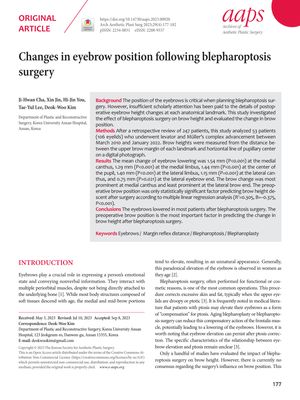Changes In Eyebrow Position Following Blepharoptosis Surgery
October 2023
in “
Archives of Aesthetic Plastic Surgery
”

TLDR Blepharoptosis surgery usually lowers the eyebrows, especially near the nose.
This study of 53 patients (106 eyelids) found that blepharoptosis surgery generally results in lowered eyebrows, with the most significant lowering at the medial canthus (1.54 mm) and the least at the lateral brow end (0.75 mm). The preoperative brow position was the most significant predictor of postoperative brow height descent. The study highlights the importance of considering preoperative brow position for predicting surgical outcomes, despite limitations such as its retrospective nature, lack of levator function analysis, and a relatively small sample size.